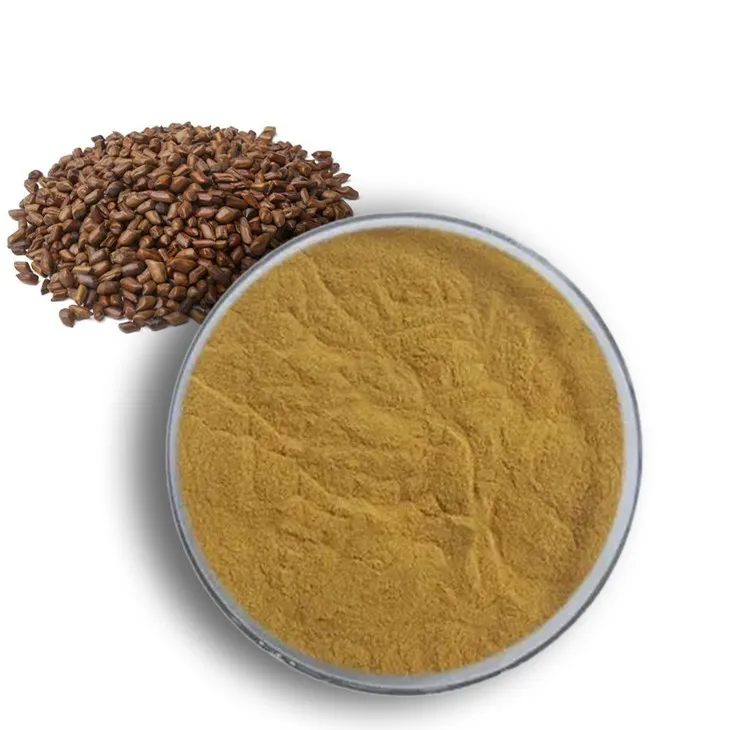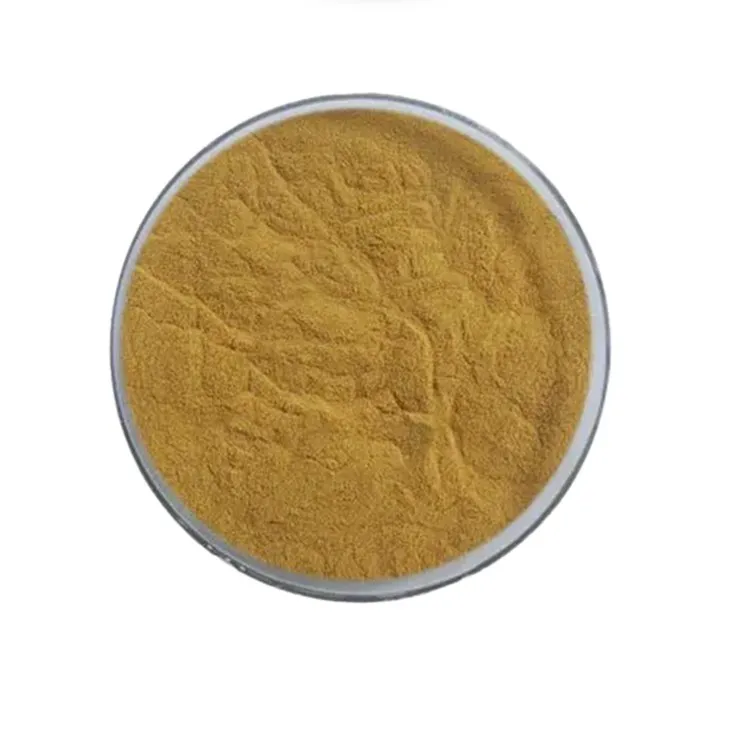- 0086-571-85302990
- sales@greenskybio.com
Cassia seed extract: Is the extract effective for weight loss?
2024-11-11

1. Introduction
In the quest for effective weight - loss solutions, many people are turning to natural products. One such product that has gained attention is Cassia Seed Extract. This article aims to explore whether Cassia Seed Extract is truly effective for weight loss. It will analyze the components of the extract, the possible mechanisms through which it might work, scientific studies on its efficacy, and also address safety concerns and potential side effects.

2. Components of Cassia Seed Extract
Cassia seeds contain a variety of bioactive compounds that may contribute to its potential weight - loss effects. Anthraquinones are one of the main components. These compounds are known for their laxative properties in some cases, which could potentially play a role in weight management by promoting bowel movements and reducing constipation - related bloating. Another important group of compounds are flavonoids. Flavonoids are generally associated with antioxidant and anti - inflammatory properties. In the context of weight loss, they may influence the body's metabolic processes. For example, some flavonoids have been shown to affect lipid metabolism, which could be relevant to reducing body fat.

3. Possible Mechanisms for Weight Loss
3.1 Influence on Metabolism
One of the proposed mechanisms by which cassia seed extract may aid in weight loss is through its impact on metabolism. Metabolism is the set of chemical reactions that occur in the body to maintain life. These reactions are involved in processes such as converting food into energy and building or breaking down molecules. Cassia seed extract may enhance the basal metabolic rate (BMR). The BMR is the amount of energy expended by the body at rest to maintain basic physiological functions such as breathing, circulation, and cell production. By increasing the BMR, the body would burn more calories at rest, which could contribute to weight loss over time. Some of the bioactive compounds in the extract, such as flavonoids, may interact with enzymes involved in metabolic pathways. For instance, they could potentially affect the activity of enzymes related to fat metabolism, such as lipoprotein lipase. This enzyme is involved in the breakdown of triglycerides in the blood, and an alteration in its activity could lead to changes in fat storage and utilization in the body.
3.2 Appetite Suppression
Another possible mechanism is appetite suppression. Controlling appetite is crucial for weight management as consuming fewer calories than the body expends is necessary for weight loss. Cassia seed extract may act on the body's appetite - regulating hormones. Hormones such as ghrelin and leptin play important roles in appetite control. Ghrelin is often referred to as the "hunger hormone" as it stimulates appetite, while leptin signals satiety. There is some evidence to suggest that certain components in cassia seed extract could affect the levels or activity of these hormones. For example, if the extract can reduce ghrelin levels or increase leptin sensitivity, it could lead to a decrease in appetite. This would result in reduced food intake, ultimately contributing to weight loss.

4. Scientific Studies on Cassia Seed Extract and Weight Loss
Several scientific studies have been conducted to investigate the relationship between cassia seed extract and weight loss. In one animal study, rats were fed a diet supplemented with cassia seed extract. The results showed that the rats in the treatment group had a significant reduction in body weight compared to the control group. The researchers observed changes in lipid metabolism markers, suggesting that the extract may have influenced fat metabolism in the rats. However, it is important to note that animal studies may not always directly translate to human results.
In a small - scale human study, participants were given cassia seed extract supplements for a certain period. Some participants reported a decrease in appetite and a modest reduction in body weight. However, the study had limitations such as a relatively short duration and a small sample size. Larger and more comprehensive human studies are needed to draw more definitive conclusions about the effectiveness of cassia seed extract for weight loss.

5. Safety Concerns and Side Effects
5.1 Laxative Effects
As mentioned earlier, cassia seed extract contains anthraquinones, which can have laxative properties. While this may seem beneficial for weight loss in terms of promoting bowel movements and reducing bloating, excessive or long - term use of laxatives can lead to problems. Prolonged use of strong laxatives can cause the colon to become dependent on them for normal bowel movements. This can disrupt the natural rhythm of the digestive system and may lead to electrolyte imbalances. Electrolytes such as potassium, sodium, and chloride are important for maintaining proper nerve and muscle function, as well as fluid balance in the body.
5.2 Allergic Reactions
Some individuals may be allergic to components in cassia seed extract. Allergic reactions can range from mild symptoms such as skin rashes, itching, and hives to more severe symptoms like difficulty breathing and swelling of the face, throat, or tongue. It is important for those considering using cassia seed extract to be aware of the potential for allergic reactions, especially if they have a history of allergies to other plant - based products.
5.3 Interaction with Medications
Cassia seed extract may interact with certain medications. For example, if a person is taking medications for diabetes or blood pressure, the extract could potentially interfere with the effectiveness of these drugs. It may also increase the risk of side effects. Therefore, it is crucial for individuals on medications to consult their healthcare provider before using cassia seed extract. This is especially important for those with underlying health conditions who are more vulnerable to the potential negative impacts of such interactions.
6. Conclusion
In conclusion, cassia seed extract shows some potential for weight loss through its possible effects on metabolism and appetite suppression. However, the current scientific evidence is not conclusive. While some animal and small - scale human studies suggest positive effects, larger and more rigorous studies are needed. Additionally, there are safety concerns associated with the use of cassia seed extract, including laxative effects, allergic reactions, and potential interactions with medications. For those interested in using cassia seed extract as a weight - loss aid, it is advisable to consult a healthcare professional first. This will ensure that the potential benefits are weighed against the possible risks, and that the use of the extract is appropriate for their individual health situation.
FAQ:
What are the main components in cassia seed extract?
Cassia seed extract contains various components. Some of the main ones include anthraquinones such as emodin, rhein, and their glycosides. These components are believed to play a role in the potential effects of the extract, including those related to weight management.
How does cassia seed extract influence metabolism?
There are some proposed ways in which cassia seed extract may influence metabolism. It might interact with certain enzymes involved in metabolic pathways. For example, it could potentially affect lipid metabolism by influencing the breakdown and utilization of fats. However, more research is needed to fully understand the exact mechanisms at work.
Can cassia seed extract really suppress appetite?
There is some evidence to suggest that cassia seed extract may have an appetite - suppressing effect. It could potentially act on the body's hunger signaling mechanisms in the brain or the gut. But the degree of this effect can vary among individuals, and it is not yet fully established as a reliable appetite suppressant.
Are there any safety concerns associated with using cassia seed extract?
Yes, there are safety concerns. Due to its anthraquinone content, excessive use of cassia seed extract may lead to gastrointestinal issues such as diarrhea, abdominal cramps, and electrolyte imbalances. Also, long - term use at high doses may have potential impacts on liver and kidney function. Pregnant and breastfeeding women should especially avoid using it without medical advice.
How much cassia seed extract should be taken for potential weight loss?
There is no standard recommended dose for using cassia seed extract for weight loss. Dosage can depend on various factors such as an individual's overall health, body weight, and tolerance. Moreover, given the safety concerns, it is crucial not to self - medicate or exceed recommended levels, and it is best to consult a healthcare provider before starting any supplementation.
Related literature
- The Potential of Cassia Seed Extract in Obesity Management: A Review"
- "Cassia Seed Extract: Composition, Biological Activities, and Implications for Weight Loss"
- "Safety and Efficacy of Cassia Seed Extract in Dietary Supplements for Weight Management"
- ▶ Hesperidin
- ▶ citrus bioflavonoids
- ▶ plant extract
- ▶ lycopene
- ▶ Diosmin
- ▶ Grape seed extract
- ▶ Sea buckthorn Juice Powder
- ▶ Beetroot powder
- ▶ Hops Extract
- ▶ Artichoke Extract
- ▶ Reishi mushroom extract
- ▶ Astaxanthin
- ▶ Green Tea Extract
- ▶ Curcumin Extract
- ▶ Horse Chestnut Extract
- ▶ Other Problems
- ▶ Boswellia Serrata Extract
- ▶ Resveratrol Extract
- ▶ Marigold Extract
- ▶ Grape Leaf Extract
- ▶ blog3
- ▶ blog4
- ▶ blog5
-
Organic Tongkat Ali extract powder factory.
2024-11-11
-
How to make powder with ashwagandha extract.
2024-11-11
-
Rosehip extract manufacturers from China.
2024-11-11
-
The best cat's claw extract in nature.
2024-11-11
-
Chinese Dandelion Leaf Extract Suppliers.
2024-11-11
-
Nettle Root Extract
2024-11-11
-
Buckthorn bark extract
2024-11-11
-
Artichoke Extract
2024-11-11
-
Garcinia Cambogia Extract
2024-11-11
-
Apricot Powder
2024-11-11
-
Fig Extract
2024-11-11
-
Sugarcane Extract
2024-11-11
-
Citrus bioflavonoids
2024-11-11
-
Baicalin
2024-11-11
-
Phellodendron Extract
2024-11-11





















